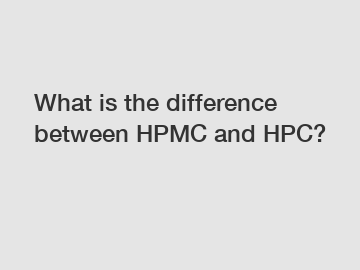What is the difference between HPMC and HPC?
What is the difference between HPMC and HPC? HPMC (Hydroxypropyl Methylcellulose) and HPC (Hydroxypropyl Cellulose) are both widely used in various industries, including pharmaceuticals, construction, and personal care products. While they may appear similar due to their similar names and properties, there are distinct differences between these two cellulose derivatives.
To understand the difference between HPMC and HPC, it is necessary to look at their chemical structures. HPMC is a derivative of methylcellulose, where some hydroxyl groups have been replaced with methoxy and hydroxypropyl groups. On the other hand, HPC is a derivative of cellulose, where some hydroxyl groups have been replaced with hydroxypropyl groups. This slight difference in chemical structure results in variations in their physical and chemical properties.

The main difference between HPMC and HPC lies in their solubility in water. HPC is soluble in both hot and cold water, making it suitable for a wide range of applications. On the contrary, HPMC exhibits a lower solubility in cold water and requires the water temperature to be higher for proper dissolution. This solubility difference is due to the presence of the methoxy groups in HPMC, which reduce the water solubility compared to HPC.
Furthermore, the solubility of HPMC and HPC affects their performance in different applications. The delayed dissolution of HPMC in cold water makes it ideal for sustained-release formulations in pharmaceuticals. It allows for controlled drug release, ensuring the medication is gradually released over a longer period. In contrast, the high water solubility of HPC makes it suitable for rapid disintegration in tablets and quick release of active ingredients.
Another aspect to consider is the film-forming ability of HPMC and HPC. Both derivatives have excellent film-forming properties, but there are variations in their film characteristics. HPMC forms films that are more flexible and have better elongation properties. This property is beneficial in pharmaceutical applications where films need to bend and flex without breaking. On the other hand, HPC films are relatively harder and have better mechanical strength, making them preferred in applications where stiffness and rigidity are required, such as in oral disintegrating films.
In conclusion, the key difference between HPMC and HPC lies in their solubility in water, which is determined by their chemical structures. HPMC has lower solubility due to the presence of methoxy groups, while HPC is highly soluble in both hot and cold water. This solubility difference impacts their performance in sustained-release formulations and tablet disintegration. Furthermore, the film-forming properties of these derivatives also vary, with HPMC offering flexibility and HPC providing rigidity. Understanding these differences is crucial for selecting the appropriate cellulose derivative for specific applications in various industries.
If you are looking for more details, kindly visit our website.
If you want to learn more, please visit our website China HPMC suppliers.



